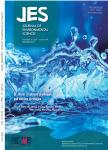Use of Fe/Al drinking water treatment residuals as amendments for enhancing the retention capacity of glyphosate in agricultural soils
Use of Fe/Al drinking water treatment residuals as amendments for enhancing the retention capacity of glyphosate in agricultural soils作者机构:The Key Laboratory of Water and Sediment Sciences Ministry of Education School of Environment Beijing Normal University School of Agriculture and Food Sciences University of Queensland State Key Laboratory of Lake Science and Environment Nanjing Institute of Geography and Limnology Chinese Academy of Sciences
出 版 物:《Journal of Environmental Sciences》 (环境科学学报(英文版))
年 卷 期:2015年第27卷第8期
页 面:133-142页
核心收录:
学科分类:082803[工学-农业生物环境与能源工程] 08[工学] 0828[工学-农业工程]
基 金:supported by the National Natural Science Foundation of China (Nos.51278055, 51179008) the National Key Technology R&D Program (No.2012BAJ21B08) the National Public Benefit (Environmental) Research Foundation of China (No.201109009)
主 题:Glyphosate Soil amendment Fe/Al drinking water treatment residuals Sorption capacity Stability
摘 要:Fe/Al drinking water treatment residuals(WTRs), ubiquitous and non-hazardous by-products of drinking water purification, are cost-effective adsorbents for glyphosate. Given that repeated glyphosate applications could significantly decrease glyphosate retention by soils and that the adsorbed glyphosate is potentially mobile, high sorption capacity and stability of glyphosate in agricultural soils are needed to prevent pollution of water by ***, we investigated the feasibility of reusing Fe/Al WTR as a soil amendment to enhance the retention capacity of glyphosate in two agricultural soils. The results of batch experiments showed that the Fe/Al WTR amendment significantly enhanced the glyphosate sorption capacity of both soils(p 〈 0.001). Up to 30% of the previously adsorbed glyphosate desorbed from the non-amended soils, and the Fe/Al WTR amendment effectively decreased the proportion of glyphosate desorbed. Fractionation analyses further demonstrated that glyphosate adsorbed to non-amended soils was primarily retained in the readily labile fraction(Na HCO3-glyphosate). The WTR amendment significantly increased the relative proportion of the moderately labile fraction(HCl-glyphosate) and concomitantly reduced that of the Na HCO3-glyphosate, hence reducing the potential for the release of soil-adsorbed glyphosate into the aqueous phase. Furthermore, Fe/Al WTR amendment minimized the inhibitory effect of increasing solution p H on glyphosate sorption by soils and mitigated the effects of increasing solution ionic strength. The present results indicate that Fe/Al WTR is suitable for use as a soil amendment to prevent glyphosate pollution of aquatic ecosystems by enhancing the glyphosate retention capacity in soils.



